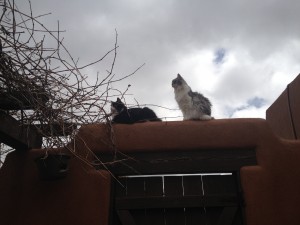 Jackson has been enjoying the summer, by which I mean, he totally wears himself out playing and then crashes into deathlike sleep for hours on end. He never moved when I took this pic.
Jackson has been enjoying the summer, by which I mean, he totally wears himself out playing and then crashes into deathlike sleep for hours on end. He never moved when I took this pic.
I was playing around on Twitter this morning as I contemplated what to blog about today. My list of potential topics is over 40 now, which is truly unmanageable. I really need to cull them. Some I’m no longer fired up about. Or I’ve delayed too long and they’re no longer relevant. But this is one of those things I think about as I’m browsing my top-heavy list and then, once I happily settle on a topic, I close it and move on.
By the time I’d finished going through emails and various other sorting tools for the day ahead, I’d seen this tweet go by:
People of New York – if you are paying $100 for delivery of a Cronut – there may be something broken in your priority setting mechanism
The person was referring to this deal, if you care. I don’t, but I searched for it, so you don’t have to. I’m generous like that.
What left a sour taste in my mouth was, not the willingness of people to pay for pricey pastries, but the judgement of the person sending this tweet. It presupposes that the tweeter knows what the correct priorities are. It also demonstrates a lack of compassion for other people’s lives. Maybe a cronut doesn’t seem worth it to me, but how am I to judge its worth to someone else?
It dovetailed with a lingering annoyance about a Dear Abby letter I read last night – and made a note to add to my topic list. The person wrote this:
DEAR ABBY: In this season of graduations and weddings, I would like to urge the honorees to send proper thank-you notes to friends and family who give them gifts and money. Time, money and preparation are put into these events, and the effect is spoiled when guests have to contact stores or scrutinize their bank statements to learn if their gifts were, indeed, received but simply not acknowledged. Thank-yous aren’t difficult. Some “rules”: Rather than text or email, write a note on paper and mail it with a stamp via the U.S. mail. If you do, you will be forever known as “that polite young couple” or “the young man/woman who sent the nice note.” Three lines are all that are needed: “Thank you for the —-. I look forward to using/enjoying it when we entertain/grill/vacation/walk the dog, etc. Again, I appreciate your thoughtfulness.” That’s it! If showing good manners isn’t incentive enough, remember this: These are the people you will be inviting to weddings, baby showers, and your own children’s graduations and weddings in the not-so-distant future. A little courtesy goes a long way. — APPRECIATIVE IN HITCHCOCK, TEXAS
Now, those of you who know me, know I have a THING about thank-you notes. I even have used the tag on this blog before. And this particular letter sums up everything that I hate about them. Among them:
- “proper thank-you notes” – appreciation is not enough, it has to be the Proper Kind. There are RULES.
- “the effect is spoiled” – because the spirit of giving is simply not enough.
- “Thank-yous aren’t difficult” – there’s that judgement thing. You don’t know what is difficult for someone else.
- “Some ‘rules'” – why are there freaking RULES about receiving a gift that should be freely given???
- “rather than text or email” – why? why? why? why does only paper “count”???
- “you will be forever known as…” – so, really, this is a form of social blackmail, right?
- the template – if it’s this formulaic, what on earth makes it meaningful? this isn’t gratitude, it’s a receipt.
- “If showing good manners isn’t incentive enough…” – then we should do this to ensure steady delivery of future gifts? Isn’t that awfully damn mercenary?
Back when I was graduating from college, my mom and I had a Terrible Fight. We have never fought much, but this was a doozy. In fact, I recall it as the biggest fight we’ve ever had. (I don’t know if it felt that way to her.)
And it was over thank-you notes.
So, there I was, spring semester of senior year. As usual, I was way over-committed, a lifetime tendency I’ve attempted to curb. I was taking a full course load – including re-taking freaking Immunology because I’d inexplicably gotten a D in it and I needed a C- for my major. I’d passed both semesters of Organic Chemistry, but Immunology? No no no. (I did pass – with a C-, even on the second go! I have no idea what my deal was.) Anyway, there were classes. Plus my honors thesis in Religious Studies, which I’d delayed from the previous semester. I was in a play, so I was in rehearsals or performance most every night. I was director of our peer counseling center and we’d had a number of issues. We were having trouble with my sorority chapter, in which I’d invested so much time and love. I was working at the med school on a research project and applying for grad schools and interviewing for the Peace Corps and trying to decide what to do with the Rest of My Life. On top of all of this, I felt the onrushing deadline of college ending, which meant I would lose this family I’d become a part of. I knew that, though, we’d keep in touch, that the friendships I’d made would end in this very temporal way. I wanted to be with people as much as possible.
I was frankly overwhelmed.
Meanwhile, all the wonderful people who’d supported me growing up, were sending me graduation gifts. Thoughtful, wonderful and generous gifts. And I was not writing thank-you notes.
(This is why it really puts my back up when someone proclaims that something “is not difficult.”)
Of course, it became one of those tasks that simply grew worse the longer I neglected it. At first I hadn’t written one, then I hadn’t written five, ten, twenty. And these were my mom’s friends, asking her if I’d received their gifts. She felt I made her look bad. We had a big fight on the phone and I ended up sobbing because it was just more than I could bear to deal with.
I profoundly wished that none of those people had sent me gifts at all.
It all worked out. I eventually wrote the thank-you notes and my mom and I joke about that incident from time to time. She had her own stuff going on that got displaced into our fight. She also declared me officially detached and that I could bear the social burden of non-thank-you noting on my own, which I gladly accepted.
This is why you will never get a thank-you note from me. Certainly not a proper one. Really, if you need one, I’d really rather you not give me anything at all. I’m totally good with that!
I’m also, always and forever, absolutely fine with you not sending me a thank-you note.
So, here is my message:
DEAR EVERYONE: In this season of graduations and weddings, I would like to urge those giving gifts and money to friends and family to also give the gift of tolerance. If you feel the effect of your time and money is spoiled when you have to contact stores or scrutinize their bank statements to learn if your gifts were, indeed, received but simply not acknowledged, then don’t send anything. Thank-yous may not seem difficult to you, but for people going through major life events, they can be the thing that knocks over the teetering, towering To Do pile. Some “rules”: Texts and emails – even phone calls – can still be heartfelt communications. Please don’t measure the sincerity of someone’s appreciation by the price of a stamp and notepaper. People can still be “that polite young couple” or “the young man/woman who sent the nice note” if they avail themselves of electronic communications. Please recall that your gifts of time and money are totally voluntary. You are not required to give anything and it might be best if you don’t, if you’re only giving so you can receive a particular template response. Often the greatest gift you can give is understanding and compassion. A little tolerance for the pressure other people are under goes a long way. — APPRECIATIVE IN SANTA FE, NEW MEXICO
